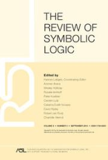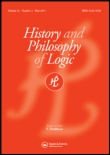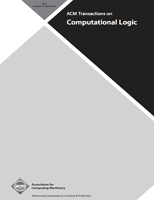
Studia Logica
Scope & Guideline
Charting New Territories in Logic and Science
Introduction
Aims and Scopes
- Foundational Studies in Logic:
The journal publishes research that delves into the fundamental principles of logic, including both classical and non-classical logics, exploring their theoretical underpinnings and implications. - Applications of Logic in Computer Science:
There is a strong focus on the application of logical frameworks in computer science, including topics such as formal verification, computational logic, and algorithmic aspects of logic. - Philosophical Implications of Logic:
Papers often investigate the philosophical dimensions of logical systems, particularly in relation to truth, meaning, and epistemology, contributing to ongoing debates in the philosophy of logic. - Categorical and Algebraic Logic:
The journal features work that employs categorical and algebraic approaches to logic, emphasizing structures such as algebras and categories that arise in various logical contexts. - Modal and Intuitionistic Logics:
There is a significant emphasis on modal and intuitionistic logics, with research exploring their axiomatizations, semantics, and applications across various fields. - Paraconsistency and Non-classical Logics:
Research addressing paraconsistent logics and other non-classical frameworks is prominent, highlighting the ability to manage contradictions and their implications for logical theory. - Dynamic and Epistemic Logics:
The journal explores dynamic logics that model change and interaction, as well as epistemic logics that address knowledge and belief, reflecting current trends in logical research.
Trending and Emerging
- Quantum Logic and Its Applications:
There is a growing trend in exploring the intersection of quantum mechanics and logic, with papers investigating quantum interpretations of logical paradoxes and the implications for traditional logical systems. - Categorical Logic:
Research employing categorical methods is increasingly prominent, reflecting a trend towards using category theory as a foundational framework for understanding various logical systems. - Paraconsistent and Inconsistent Logics:
The exploration of paraconsistent logics and frameworks that handle inconsistency is on the rise, showcasing a heightened interest in addressing contradictions within logical systems. - Dynamic and Temporal Logic:
Emerging themes include dynamic and temporal logics, which model change and time, especially in contexts such as social networks and computational scenarios. - Epistemic Logic and Knowledge Representation:
There is a noticeable increase in research focused on epistemic logic, particularly regarding its applications in artificial intelligence and knowledge representation. - Applications of Logic in Artificial Intelligence:
The intersection of logic and AI is gaining momentum, with papers exploring how logical frameworks can inform and enhance AI systems, including reasoning and decision-making processes.
Declining or Waning
- Classical Logic:
Research focused solely on classical logic has seen a decrease, as the community increasingly favors explorations of non-classical logics and their applications. - Elementary Proof Techniques:
There has been a waning interest in elementary proof techniques, with fewer papers dedicated to straightforward, traditional methodologies as more complex and abstract approaches gain traction. - Basic Set Theory:
Papers addressing basic set theory concepts appear less frequently, possibly due to a shift towards more advanced or specialized topics in set-theoretic logic. - Historical Studies of Logic:
While historical perspectives remain valuable, there is a noticeable reduction in papers exclusively focused on the history of logic, as contemporary applications and theories take precedence. - Standard Modal Logics:
Research on standard modal logics has diminished, likely due to the exploration of more nuanced or hybrid modal frameworks that extend beyond traditional boundaries.
Similar Journals

Review of Symbolic Logic
Fostering Innovation in Logic and PhilosophyReview of Symbolic Logic is a prestigious academic journal published by Cambridge University Press, dedicated to advancing the field of logic through critical analysis and innovative research. Established in 2008, the journal has become a key fixture in the academic community, particularly recognized for its contributions in the realms of logic, mathematics (miscellaneous), and philosophy. With an impressive classification of Q1 across multiple categories in 2023, it ranks within the top echelons of its field, standing at 15th out of 41 in Logic and 29th out of 90 in miscellaneous mathematics, positioning itself as essential reading for scholars and practitioners alike. Although not Open Access, the journal offers robust access options through institutional subscriptions, providing an expansive platform for the dissemination of high-quality research. Review of Symbolic Logic aims to foster a deeper understanding of symbolic logic's applications and implications while inspiring emerging scholars and seasoned researchers to further the dialogue within this vibrant area of study.

Scientific Annals of Computer Science
Empowering Researchers to Shape Tomorrow's TechnologiesScientific Annals of Computer Science, published by Alexandru Ioan Cuza University of Iasi, Romania, is an esteemed open access journal that has been disseminating knowledge since 2007. With the ISSN 1843-8121 and a focus on the fields of applied mathematics and computer science, this journal supports researchers and practitioners by providing a platform for innovative ideas and substantial advancements in computational methodologies. Despite its current Q4 ranking in both Applied Mathematics and General Computer Science categories, the journal is dedicated to expanding the horizons of scientific inquiry through the convergence of theoretical and practical perspectives. Covering research from 2009 to 2024, the journal aims to elevate scholarly communication and ensure accessibility by presenting its articles free of charge, inviting contributions that can shape the future of technology and mathematics. By embracing an open access model, Scientific Annals of Computer Science aligns with the global movement towards making scientific knowledge universally accessible, thereby fostering collaboration and knowledge-sharing among researchers, professionals, and students alike.

HISTORY AND PHILOSOPHY OF LOGIC
Illuminating the Historical Landscape of LogicHISTORY AND PHILOSOPHY OF LOGIC is a prestigious journal published by Taylor & Francis Ltd, focusing on the intricate relationships between historical contexts and philosophical inquiries within the realm of logic. With its ISSN 0144-5340 and E-ISSN 1464-5149, the journal has established itself as a vital academic resource since its inception in 1980 and will continue to contribute to the field until 2024. It holds an impressive status, ranking in the Q1 category in History and Q2 in History and Philosophy of Science according to the 2023 category quartiles. This journal is recognized for its high-impact research, achieving notable positions in Scopus ranks, including 80th percentile in Arts and Humanities - History and 58th percentile in History and Philosophy of Science. Although it does not offer open access, it remains a crucial platform for scholars, researchers, and students aiming to explore and advance knowledge at the intersection of logic's history and its philosophical implications.

ACM Transactions on Computational Logic
Fostering Collaboration in Computational InnovationACM Transactions on Computational Logic, published by the Association for Computing Machinery, is a premier journal dedicated to the advancement of computational logic, spanning the disciplines of computer science and mathematics. With its ISSN 1529-3785 and E-ISSN 1557-945X, this journal has established itself as a vital resource within the academic community, particularly noted for its influential contributions reflected in its 2023 scopus rankings. The journal holds notable quartile rankings, achieving Q1 in the fields of Computer Science (miscellaneous) and Logic, alongside Q2 in Computational Mathematics and Theoretical Computer Science, indicating its prestigious position in the respective categories. Researchers, practitioners, and students can access a wealth of rigorous research articles that delve into both theoretical frameworks and practical applications of computational logic, fostering innovation and collaboration in the field. As it converges towards its 2024 objectives, ACM Transactions on Computational Logic continues to uphold a commitment to excellence and impact, striving to shape the future of computational theories and methodologies.

Logic and Logical Philosophy
Fostering Dialogue in Logical PhilosophyLogic and Logical Philosophy is a distinguished journal published by Nicolaus Copernicus University Torun, Poland. With its ISSN 1425-3305 and E-ISSN 2300-9802, the journal has established itself as a premier outlet for cutting-edge research in the field of philosophy, specifically focusing on the intricate intersections of logic and philosophical inquiry. Since its inception, the journal has consistently demonstrated its impact within the academic community, achieving a commendable Q1 ranking in the 2023 Arts and Humanities category, placing it in the 73rd percentile of publications in the field. The journal aims to foster scholarly dialogue and contribute significantly to the advancement of philosophical understanding through rigorous research articles, critical reviews, and discussions. With a commitment to high academic standards and accessibility—though specific access options may vary—Logic and Logical Philosophy remains an essential resource for researchers, professionals, and students alike, paving the way for innovative philosophical discourse until 2024 and beyond.

Logica Universalis
Pioneering Research in Logic and Applied MathematicsLogica Universalis is an esteemed academic journal published by SPRINGER BASEL AG, dedicated to advancing the fields of Applied Mathematics and Logic. With its ISSN 1661-8297 and E-ISSN 1661-8300, the journal has been active from 2007 and continues to contribute significantly to the discourse surrounding mathematical logic and its applications up to 2024. Located in Basel, Switzerland, Logica Universalis holds a notable position within the academic community, evidenced by its ranking within the Q4 category of both Applied Mathematics and Logic as of 2023. While it currently operates without Open Access options, the journal remains a pivotal resource for researchers and practitioners seeking to explore foundational and applied aspects of logic. Moreover, with a Scopus rank of #22/41 in Logic and #464/635 in Applied Mathematics, it provides a platform for comprehensive knowledge dissemination and facilitates innovative research that bridges theoretical and practical methodologies. This journal is instrumental for anyone looking to deepen their understanding and make meaningful contributions to these intertwined domains.

JOURNAL OF LOGIC AND COMPUTATION
Pioneering Insights in Logic and Computational ScienceJOURNAL OF LOGIC AND COMPUTATION, published by Oxford University Press, is a leading peer-reviewed journal dedicated to advancing research in the intersections of logic, computation, and theoretical frameworks of computer science. With an ISSN of 0955-792X and an E-ISSN of 1465-363X, the journal has established itself within academic circles, boasting significant impact evidenced by its category quartiles, including a Q1 ranking in Arts and Humanities (miscellaneous) and a Q2 in Logic for 2023. This prestigious journal emphasizes interdisciplinary approaches to understanding computational systems, hence targeting a diverse audience of researchers, professionals, and students keen on exploring provocative questions in logic and computation. Although not open access, the content is highly valuable, reflecting contemporary challenges and advancements in the field. With over three decades of published work, spanning from 1990 to 2024, the journal continues to contribute richly to the discourse surrounding logical methodologies and computational innovations, making it an essential resource for those engaged in these dynamic areas of study.

Journal of Applied Mathematics & Informatics
Unveiling New Frontiers in Applied Mathematics and Computational Science.Journal of Applied Mathematics & Informatics is a peer-reviewed academic journal published by the Korean Society of Computational & Applied Mathematics (KSCAM), focusing on the integration and application of mathematical theories and computational techniques across various domains. Established in 2019, this journal serves as a platform for researchers, professionals, and students to share innovative methodologies, practical applications, and theoretical advancements in fields like analysis, applied mathematics, and computational theory. As a Q4 ranked journal according to the 2023 category quartiles in analysis, applied mathematics, computational mathematics, and miscellaneous mathematics, it provides a valuable, albeit niche, contribution to the academic landscape. While the journal currently operates without open access options, it aims to disseminate quality research to foster collaboration and knowledge exchange within the mathematics and computer science communities. Researchers looking to explore emerging trends and methodologies in applied mathematics and informatics will find an essential resource in this journal, which is based in Daejeon, South Korea.

AIMS Mathematics
Elevating mathematical discourse with cutting-edge research.AIMS Mathematics, published by the American Institute of Mathematical Sciences (AIMS), is a premier open-access journal that has been providing a platform for innovative research since its inception in 2016. With a keen focus on diverse areas within the field of mathematics, this journal aims to disseminate high-quality studies that cater to both theoretical and applied aspects of mathematics. As evidenced by its impressive Scopus rank of 52 out of 399 in the category of General Mathematics, placing it in the 87th percentile, AIMS Mathematics stands as a significant contributor to the academic discourse in this discipline. The journal operates under Q2 in Mathematics (miscellaneous) for its 2023 category quartiles, reflecting its rigorous peer-reviewed process and substantial impact on current mathematical research. Accessible since its launch, the journal's open-access model ensures that researchers, professionals, and students alike can easily retrieve insights and advancements in mathematics, fostering collaboration and the advancement of knowledge globally.

Logical Methods in Computer Science
Connecting scholars to the future of computer science.Logical Methods in Computer Science is a premier Open Access journal dedicated to fostering scholarly dialogue within the realms of Computer Science and Theoretical Computer Science. Established in 2004 and published by LOGICAL METHODS COMPUTER SCIENCE E V in Germany, this journal aims to bridge theoretical frameworks and practical applications, providing a platform for innovative research and discoveries. With an impressive HIndex reflecting its commitment to high-quality research, Logical Methods in Computer Science has achieved a Q2 ranking in both the miscellaneous and theoretical categories of computer science, indicating its growing influence in the academic community. Researchers, professionals, and students are encouraged to access and engage with the wealth of knowledge this journal offers, which is freely accessible to facilitate widespread dissemination of cutting-edge advancements in logical methods. With its convergence period extending from 2005 to 2024, Logical Methods in Computer Science continues to be a vital resource for those looking to explore the intersections of logic, computation, and mathematics.